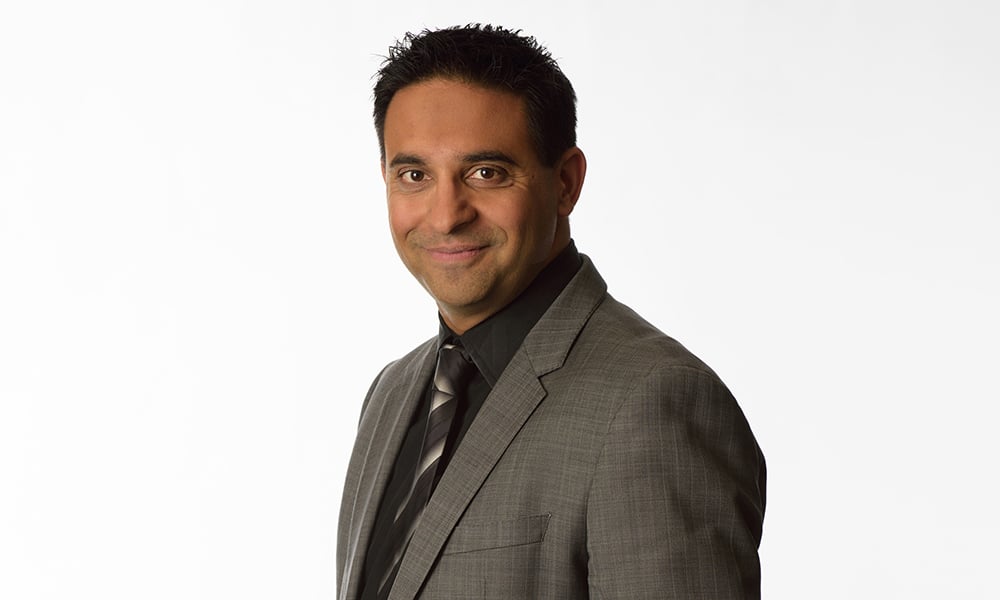Faisal Karmali, of the Popowich Karmali Advisory Group, believes health should be part of more retirement planning conversations

Over the course of the pandemic, countless Canadians woke up to the fact that beyond wealth, health is something that should be protected and safeguarded. And Faisal Karmali’s clients were certainly among that group.
“Because of the pandemic, the view of what they're they thought they would be doing in retirement from a health perspective has changed,” says Karmali, one of the principals of the Popowich Karmali Advisory Group at CIBC Wood Gundy. He is among this year’s Top 50 Advisors, and is a regular name on the annual list.
“The issues that we've seen in long term care facilities, the access to homecare, all these different challenges that were basically magnified or highlighted during pandemic really opened up the eyes of our clients,” he says. “They were calling us to say, ‘Okay, so what do we do now?’ And that's where we start to step up our game and help.”
Of course, this isn’t exactly new to Karmali. From the time his practice pivoted to focused completely on people transitioning into or living in retirement, he says health is one of the major concerns that have emerged not just among his clients, but also the research they’ve done on retirement trends in the U.S. In some cases, clients were as concerned about the health issues that could come up as they age were as they were about outliving their money or not getting enough income in retirement.
To address those fears, he makes it a point to talk to clients about their specific health concerns. That includes talking about the history of illness in their families, as well as information from checkups, diagnostic tests, and conversations they may have with their doctors. Some clients, he says, have DNA tests done to detect genetic predispositions to certain illnesses. For those who have long-term illnesses, the discussion revolves around what they want to do, who’ll help or support them as they do it, and how they’ll pay for it.
“Some of our clients have doctors who provide binders of information of all different categories in their health,” Karmali says. “From there, we can get an understanding of what those risks are, and give them some ideas of what to think about as they age.”
From a short-term perspective, he says they encourage clients to take stock of the activities they do on a daily basis, and visualize how they’d have to manage if and when they can’t do it independently anymore. Some are fortunate to have family members to help or do things for them; others have to get outside help, which means paying for outsourced care or services.
“We find that when a lot of people in our industry do a retirement plan, they stop at retirement,” Karmali says. “They don’t recognize that as people age, they might want home care or long-term care, which would require more income than what they were using during the initial phase of the retirement plan. So we try to bridge that gap.”
After taking inventory of the possible health pitfalls and pot holes on clients’ road through retirement, Karmali and his team assess how those could impact the goals and wishes of the client. Every dollar devoted to meeting the health needs of the client, he says, means potentially putting less in other buckets like legacy or estate planning. After understanding the client’s needs and non-negotiables, Karmali and his team can start looking at what wealth strategies and solutions they can use to fill any shortfalls.
“From their total wealth, we can look at most assets, not just investments, and try to assess how they can be utilized for that sort of need,” he says. “Are there any insurance products we could be looking at in the event the problem emerges? That way, they don’t have to dip into or utilize assets they may have dedicated to other goals.”
Another planning consideration from a holistic perspective, Karmali says, is whether it makes sense for a client to right-size their home. For example, some clients might want to think about moving from a two-story residence to a bungalow, which wouldn’t necessarily lead to a reduction in costs but might make it easier as they go through the aging process.
“It's amazing how many Canadians don't realize that as they age, they may have to retrofit their home,” Karmali says. “Giving a heads up and planning in advance is something our clients are very, very appreciative of, as opposed to doing things last-minute and retrofitting, which can be a problem.”
While Canada’s government-provided healthcare is a point of pride for many citizens, Karmali and his team hold a more conservative bias by assuming that people will face more out-of-pocket health expenses as they age. With that viewpoint, they think healthcare planning is a definite need for the future that’s underrepresented in the country.
“I think more and more advisors need to look at that, and more Canadians need to be aware of this,” he says. “This is one of those times when I hope I’m wrong. But we’d rather have our clients prepared for that just in case, instead of not be ready when it hits them in the face.”



